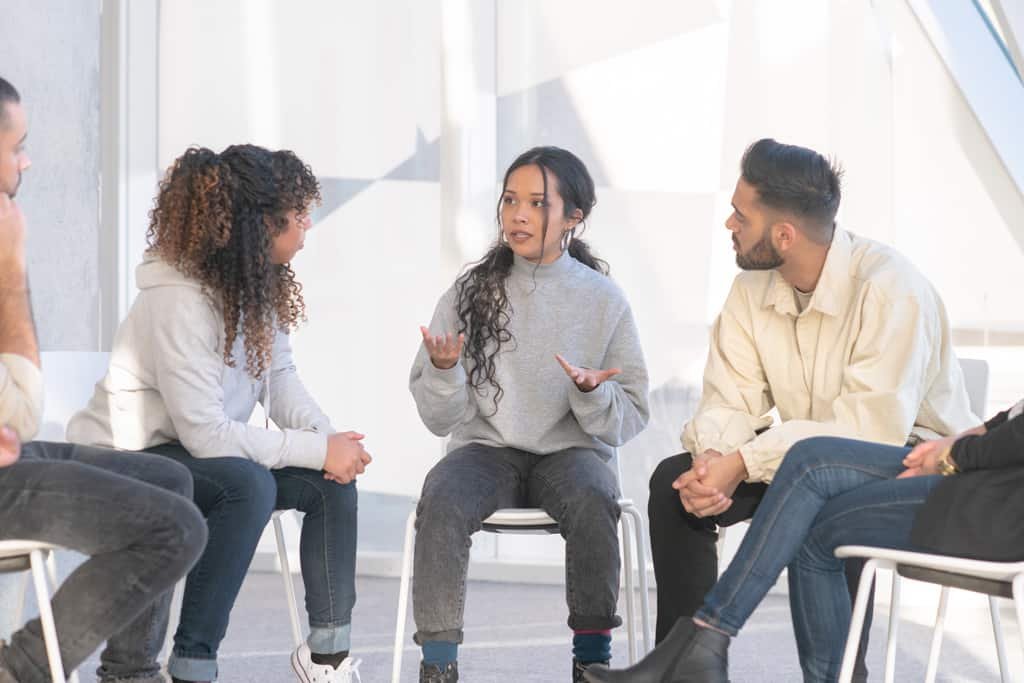Learn more about the dangers of cocaine use and how to get help with cocaine addiction in your area here.
Finding Help With Cocaine Addiction Recovery
If you or a loved one are struggling with substance use disorder (SUD), it’s important to note that everyone’s journey to recovery is different. What works for one person may not work for another. When searching for help with cocaine addiction recovery, it’s essential to work with a qualified healthcare professional to develop a treatment plan that’s tailored to your individual needs. Below are some of the most common treatment options.
Inpatient Rehabilitation
Inpatient rehabilitation involves staying at a residential facility for a period of time.1 Here, patients receive intensive treatment and support. Inpatient rehab typically includes individual and group therapy, medical and psychological evaluations, and other services to help individuals overcome their addiction.
Outpatient Rehabilitation
This option allows individuals to receive treatment while still living at home. Outpatient rehab typically involves regular therapy sessions and other forms of support. This includes group therapy and medication management.2
Behavioral Therapy
This type of therapy can help individuals learn coping skills and develop healthier habits to overcome addiction. Examples of behavioral therapies that may be used to help with cocaine addiction include:3
- Cognitive-behavioral therapy (CBT)
- Contingency management
- Motivational interviewing
Medication-Assisted Treatment (MAT)
Medications such as methadone, buprenorphine, and naltrexone can be used to help manage cravings and withdrawal symptoms during the recovery process.4
Support Groups
Support groups like Narcotics Anonymous and Cocaine Anonymous offer a supportive community of people who understand what it’s like to struggle with addiction.
Holistic Therapies
These can include activities such as yoga, meditation, acupuncture, and art therapy. These activities can help individuals manage stress and anxiety while in recovery.

How Can Individuals Access Help with Cocaine Addiction?
There are several ways individuals can access help with cocaine addiction. Some of these ways are detailed below.
Contacting a Healthcare Provider
The first step in seeking help for cocaine addiction is to contact a healthcare provider. These include a primary care physician, a psychiatrist, or a counselor. These professionals can assess the severity of the addiction and recommend appropriate treatment options.
Reaching Out to a Mental Health Hotline
There are many national and local mental health hotlines available that can provide information and support for individuals struggling with addiction.
Attending a Support Group Meeting
Support groups like Narcotics Anonymous and Cocaine Anonymous provide a safe, non-judgmental environment for individuals struggling with addiction. They allow them to connect with others who have similar experiences. These groups can offer emotional support, encouragement, and practical advice on how to manage cravings and avoid relapse.
Consulting an Addiction Specialist
Addiction specialists are healthcare professionals who specialize in treating substance use disorders. They can provide:
- Comprehensive evaluation
- Medication-assisted treatment
- Behavioral therapy
- Other forms of support to help individuals overcome addiction
Checking into a Rehab Facility
Inpatient or outpatient rehab facilities provide intensive treatment and support for individuals struggling with addiction. These facilities offer a wide range of services, including:
- Individual and group therapy
- Medication management
- Holistic therapies
Signs and Symptoms of Cocaine Addiction?
Cocaine addiction is a serious condition that can have a significant impact on a person’s physical, emotional, and social well-being. Some common signs and symptoms of cocaine addiction include:
- Physical symptoms
- Behavioral changes
- Cognitive symptoms
- Tolerance and withdrawal
- Social and interpersonal problems
Importance of Seeking Help
If you or someone you know is experiencing any of these symptoms, it may be a sign of cocaine addiction. It’s important to seek help from a qualified healthcare professional as soon as possible to start the journey to recovery.
Recognizing the Signs of Addiction
Recognizing that a loved one is struggling with addiction can be challenging, as individuals with addiction often try to hide their behavior and avoid seeking help. However, there are some signs to look out for that may indicate that a loved one is struggling with addiction. These include:
- Changes in behavior
- Physical symptoms
- Mood swings
- Financial problems
- Legal problems
- Relationship problems
How to Approach Someone Struggling with Addiction
It’s important to approach the situation with empathy and understanding. It’s also important to encourage your loved one to seek help with cocaine addiction from a qualified healthcare professional. If you’re concerned about a loved one’s substance use, consider speaking with a healthcare provider or addiction specialist for guidance on how to address the issue.
What are the Risks Associated with Cocaine Use?
Cocaine use can have a range of negative effects on a person’s physical, mental, and social well-being. Some of the risks associated with cocaine use include:
- Cardiovascular problems
- Respiratory problems
- Neurological problems
- Mental health problems
- Substance use disorder
- Social and interpersonal problems
- Overdose
It’s important to remember that the risks associated with cocaine use can be reduced by seeking help with cocaine addiction from a qualified healthcare professional.
What are Common Barriers to Seeking Help with Cocaine Addiction?
There are several barriers that may prevent individuals from seeking help with cocaine addiction. It’s important to recognize that these barriers are common and normal, and that seeking help for addiction is a brave and important step towards recovery. If you or someone you know is struggling with cocaine addiction, there are resources and support available to help overcome these barriers and start the journey to recovery.
Stigma
The stigma associated with addiction can make individuals feel ashamed or embarrassed to seek help, especially if they believe that they will be judged or labeled negatively.
Fear of Consequences
Individuals may be afraid of the consequences of seeking help. These could include losing their job, facing legal repercussions, or damaging their reputations.
Lack of Access to Resources
Some individuals may not have access to healthcare services or addiction treatment programs, either because of financial barriers or because of a lack of resources in their community.
Denial
Individuals struggling with addiction may deny that they have a problem or may be unaware of the extent of their substance use.
Reluctance to Give Up Control
Addiction can be a source of comfort or control for some individuals. They may be hesitant to give up that sense of control by seeking help.
Fear of Withdrawal Symptoms
Individuals who have developed a physical dependence on cocaine may be afraid of experiencing withdrawal symptoms, which can be uncomfortable and even dangerous.
Effective Treatment Approaches that Help with Cocaine Addiction
There are several effective treatment approaches for cocaine addiction. It’s important to note that there is no one-size-fits-all approach to addiction treatment. What works for one person may not work for another. Effective help with cocaine addiction often involves a combination of approaches tailored to an individual’s specific needs and circumstances. Seeking help from a qualified healthcare professional or addiction specialist can help determine the best course of treatment for an individual’s unique situation. Below are some examples of different treatment approaches.
Behavioral Therapy
Behavioral therapy is a type of psychotherapy that helps individuals identify and change negative thought patterns and behaviors. Cognitive-behavioral therapy (CBT) is a common type of behavioral therapy used for addiction treatment. It helps individuals develop coping strategies to avoid relapse.
Medications
There are several medications that may be used to treat cocaine addiction. These medications can help reduce cravings and prevent relapse. It’s important to note that medication alone is not typically sufficient to treat cocaine addiction. Medication should always be used in conjunction with behavioral therapy and other support services.
Medication Management
Here are some examples of medication that can help with cocaine addiction:
- Disulfiram: Disulfiram is a medication that is used to treat alcohol use disorder, but it may also help with cocaine addiction. The medication works by blocking an enzyme that helps break down cocaine. This can lead to an accumulation of the drug in the body and unpleasant side effects, such as nausea and vomiting. Disulfiram can help reduce cravings for cocaine. It may also deter individuals from using the drug due to the unpleasant side effects.
- Topiramate: Topiramate is an anticonvulsant medication that has been shown to reduce cocaine use and cravings in individuals with cocaine addiction. The medication works by increasing the activity of a neurotransmitter called GABA, which helps to reduce the rewarding effects of cocaine.
- Modafinil: Modafinil is a medication that is typically used to treat narcolepsy and other sleep disorders, but it may also be effective in treating cocaine addiction. The medication works by increasing dopamine levels in the brain. This can help reduce cocaine cravings and improve cognitive function.
Contingency Management
Contingency management is a type of behavioral therapy that provides individuals with tangible rewards. These include vouchers or prizes for achieving treatment goals like abstaining from drug use.
Motivational Interviewing
Motivational interviewing is a type of therapy that helps individuals explore their house about change. It also helps identify their personal motivations for seeking treatment.
Self-Help Groups
Self-help groups include Cocaine Anonymous (CA) and Narcotics Anonymous (NA). They can provide a supportive and understanding community for individuals recovering from cocaine addiction. These groups typically consist of individuals who are in recovery from addiction themselves. They offer a non-judgmental environment where individuals can share their experiences, challenges, and successes with others who understand what they are going through.
Benefits of Self-Help Groups
Self-help groups can be especially helpful for individuals who do not have access to or are not comfortable with traditional therapy or treatment programs. Many self-help groups use a 12-Step approach that is based on the principles of Alcoholics Anonymous (AA). Support groups are a more accessible form of help with cocaine addiction.
Residential Treatment Programs
Residential treatment programs provide a structured, supportive environment for individuals to focus on their recovery without distractions or triggers from their daily life. They can help with cocaine addiction, especially in more severe cases.
How Can Loved Ones Support Someone Who is Seeking Help with Cocaine Addiction?
Loved ones can play an important role in supporting someone who is seeking help with cocaine addiction. Some ways that they can offer support include:
- Encourage them to seek professional help
- Provide emotional support
- Help create a supportive environment
- Educate themselves
- Practice self-care
It’s important for loved ones to remember that recovery is a journey. There may be setbacks or challenges along the way. By providing consistent support and encouragement, loved ones can help their friend or family member stay motivated and committed to their recovery.
Common Misconceptions About Cocaine Addiction and Recovery
There are several common misconceptions or myths about cocaine addiction and recovery. These can make it harder for individuals to seek help and for loved ones to provide effective support.
Addiction is a Choice
One common myth is that cocaine addiction is a choice or a moral failing. In reality, addiction is a complex disease that involves changes in brain chemistry and structure.
Detox Alone is Enough
Another myth is that detoxification alone is sufficient to overcome addiction. In fact, addiction is a chronic condition that typically requires ongoing treatment and support.
Treatment is a Last Resort
There is also a misconception that addiction treatment is only for those who have hit “rock bottom” or are experiencing severe consequences. Early intervention and treatment can lead to better outcomes. By understanding and addressing these common misconceptions, individuals and loved ones can better support the journey to recovery from cocaine addiction.

Get Help with Cocaine addiction at Rockland Recovery
If you or a loved one is struggling with cocaine addiction, it’s important to seek professional help with cocaine addiction. Rockland Recovery is a leading addiction treatment center. Here, we’re prepared to provide the support and resources you need to recover from cocaine addiction.
Our Program
Our program also goes above and beyond to help you achieve long-lasting sobriety. Our team of addiction specialists offers personalized treatment plans tailored to your individual needs. This includes:
- Evidence-based therapies
- Medication-assisted treatment
- Holistic therapies
Well-Rounded Approach
At Rockland Recovery, we believe in treating the whole person, not just the addiction. Our caring and compassionate team will work with you to develop a comprehensive treatment plan. This will address all aspects of your health and well-being. We offer a range of programs and services. These include:
- Detoxification
- Residential treatment
- Intensive outpatient programs
- Aftercare support
Each service is designed to help with cocaine addiction.
Contact Rockland Recovery Today
Don’t let cocaine addiction control your life any longer. Contact Rockland Recovery today to learn more about our many treatment options. Let our team of professionals help with cocaine addiction recovery.
Table of Contents
Contact Rockland Recovery Treatment to Learn More
Our team is standing by to discuss treatment options with you. Your call is completely confidential and no obligation is required. Call Us 24/7
Resources
- https://journals.lww.com/jonmd/Abstract/1994/03000/Effectiveness_and_Costs_of_Inpatient_versus_Day.5.aspx
- https://psycnet.apa.org/record/1997-05068-007
- https://psycnet.apa.org/record/2006-08433-023
- https://journals.lww.com/co-psychiatry/Abstract/2019/07000/Medications_to_treat_cocaine_use_disorders_.4.aspx

